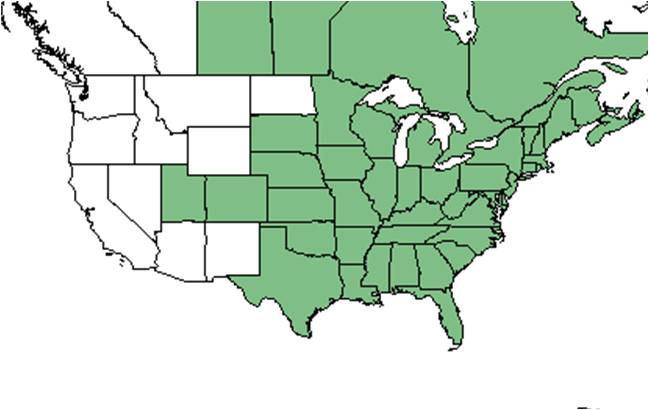Difference between revisions of "Parthenocissus quinquefolia"
(→Ecology) |
(→Ecology) |
||
| Line 30: | Line 30: | ||
<!--===Habitat===--> <!--Natural communities, human disturbed habitats, topography, hydrology, soils, light, fire regime requirements for removal of competition, etc.--> | <!--===Habitat===--> <!--Natural communities, human disturbed habitats, topography, hydrology, soils, light, fire regime requirements for removal of competition, etc.--> | ||
<!--===Phenology===--> <!--Timing off flowering, fruiting, seed dispersal, and environmental triggers. Cite PanFlora website if appropriate: http://www.gilnelson.com/PanFlora/ --> | <!--===Phenology===--> <!--Timing off flowering, fruiting, seed dispersal, and environmental triggers. Cite PanFlora website if appropriate: http://www.gilnelson.com/PanFlora/ --> | ||
| − | + | ===Seed dispersal=== | |
| + | According to Kay Kirkman, a plant ecologist, this species disperses by being consumed by vertebrates (being assumed). <ref name="KK"> Kay Kirkman, unpublished data, 2015. </ref> | ||
<!--===Seed bank and germination===--> | <!--===Seed bank and germination===--> | ||
<!--===Fire ecology===--> <!--Fire tolerance, fire dependence, adaptive fire responses--> | <!--===Fire ecology===--> <!--Fire tolerance, fire dependence, adaptive fire responses--> | ||
Revision as of 15:40, 12 April 2016
| Parthenocissus quinquefolia | |
|---|---|

| |
| Scientific classification | |
| Kingdom: | Plantae |
| Division: | Magnoliophyta - Flowering plants |
| Class: | Magnoliopsida – Dicotyledons |
| Order: | Rhamnales |
| Family: | Vitaceae |
| Genus: | Parthenocissus |
| Species: | P. quinquefolia |
| Binomial name | |
| Parthenocissus quinquefolia (L.) Planch. | |

| |
| Natural range of Parthenocissus quinquefolia from USDA NRCS Plants Database. | |
Common name: Virginia creeper
Contents
[hide]Taxonomic notes
Synonym: Parthenocissus hirsuta (Pursh) Graebner
Description
"High climbing vine with white pith and many tendrils with adhesive disks. Leaves palmately compound, petiolate; leaflets 3-7, usually 5, ovate, elliptic, or obovate, to 15 cm long and 8 cm wide, glabrous, usually pale beneath, occasionally pubescent, acuminate, coarsely serrate, usually above the middle of the blade, base cuneate or oblique, petiolulate. Inflorescence a panicle of cymes. Calyx flat, usually without lobes; petals 5, separate, yellowish green, 2-3 mm long; disk small, adnate to ovary; stamens 5, filaments short; style ca. 0.5 mm long. Drupes black or dark blue, globose, 5-9 mm in diam.; seeds 1-3, lustrous brown, planoconvex, obovoid, 3.5-4 mm long." - Radford et al 1964
Distribution
Ecology
Seed dispersal
According to Kay Kirkman, a plant ecologist, this species disperses by being consumed by vertebrates (being assumed). [1]
Pollination
The following Hymenoptera families and species were observed visiting flowers of Parthenocissus quinquefolia at Archbold Biological Station (Deyrup 2015):
Apidae: Apis mellifera
Colletidae: Colletes nudus
Halictidae: Augochloropsis anonyma, A. metallica
Megachilidae: Coelioxys sayi, Megachile mendica
Pompilidae: Episyron conterminus posterus, Tachypompilus f. ferrugineus
Vespidae: Mischocyttarus cubensis, Parancistrocerus fulvipes rufovestris, P. perennis anacardivora, Polistes bellicosus, Stenodynerus beameri, Vespula squamosa
Conservation and Management
Cultivation and restoration
Photo Gallery
References and notes
Deyrup, M.A. and N.D. 2015. Database of observations of Hymenoptera visitations to flowers of plants on Archbold Biological Station, Florida, USA.
Radford, Albert E., Harry E. Ahles, and C. Ritchie Bell. Manual of the Vascular Flora of the Carolinas. 1964, 1968. The University of North Carolina Press. 694. Print.
- Jump up ↑ Kay Kirkman, unpublished data, 2015.